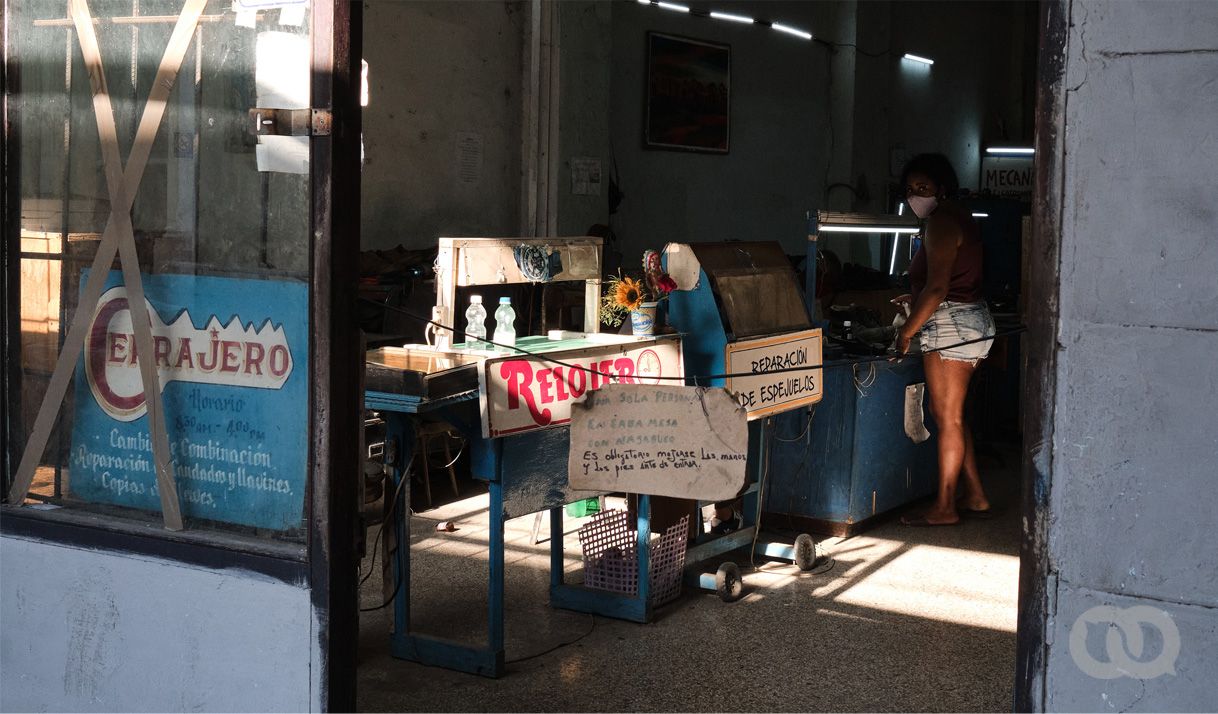Recent measures announced by the Biden Administration in relation to Cuba have once again confirmed the polarization between Cubans, living both on and outside the island. Stepping up support to independent Cuban business owners with remittances as a donation is one of the announcements that has sparked a wide range of opinions.
The question floating around is: How can these small funds become available to Cuban business owners when there is a legal ban in Cuba for them to receive foreign funding?
During a Facebook Live, activist Saily Gonzalez, who has been a small business owner in Cuba, pointed out the obstacle to this particular measure. Gonzalez believes that if the Cuban Government did allow foreign funding, business owners would be interrogated and coerced immediately so as to neutralize any dissident voices.
In the latest report published by the minister of Economy, Alejandro Gil, it became clear that Small and Medium Businesses (SMEs), are not free electrons and need to bind themselves to the state-led business sector.
“This is why I’m concerned about how this funding will get back to the investor. Will they be paid in Cuba’s (magnetic only) MLC? I would have liked this empowerment abroad to trigger more politically active attitudes in Cuban business owners, contributing to leaderships that could bring about a democracy in Cuba,” Saily Gonzalez said in the Live session organized by elTOQUE.
The Cuba Study Group’s Executive Director and consultant on US-Cuba policy, Ricardo Herrero, believes this interest is beneficial and positive as it gives Cuban entrepreneurs payment platforms and microfinance, thereby opening up a field of opportunities.
“Cuban Law stipulates that a SMEs can’t accept members that aren’t permanent residents in Cuba, but it also stipulates that they can join and make connections with private foreign companies. So, there is a chance they can receive this microfinance. We know it exists; people have been doing it on the down-low, because they’d send remittances to the entrepreneur to set up their business and then they’d split the profits,” Herrero explained.
Some young Cuban entrepreneurs, such as Erich Garcia, have faith in the existence of Cuban businesses that can receive US funding, although the business owner recognizes that the rules of the game will be established in how this works, in how money comes in, who the third parties will be and which legal processes will be involved.
“I continue to advocate for business owners and their opportunities to launch a venture and empower themselves. Limiting the tools everyone has access to, just because we’re Cuban, is wrong. If you let them prosper and understand how the global financial market works, they’ll understand themselves what kind of reality they are living in and who is placing the hurdles and obstacles; this is the only way,” the young man says.
However, Cuban intellectuals in exile, such as journalist Jorge de Armas and historian Oscar Grandio, have taken a critical stance to the announcement of this measure.
“Is it right that money from US taxpayers ends up financing economic recovery processes on the island? Is it right that microcredit is given to businesses that are going to end up contributing towards the Cuban Government? Is it right for us to give this push to a dictatorship that is showing signs of its final days? This has to do with a direct opening that benefits Cuban totalitarianism,” De Armas believes.
According to Grandio, investment facilitation services for private businesses would be viable in an ideal Cuba, but hopes that this will contribute to empowering civil society and entrepreneurs don’t have any real basis in the Caribbean country’s current situation. The historian points out the lack of a legal framework to protect private workers and US investments.
On the other hand, he believes that entrepreneurs that have an advantage in the process are generally the ones that are handpicked by the Cuban Government. “We could be empowering sectors which, far from encouraging civil society empowerment, could hinder change,” the academic says.
Have the measures been issued at the right time?
One of the greatest criticisms people both in and outside Cuba have about these measures is that the Biden Administration announced them at the completely wrong time, just a day after the controversial Cuban Penal Code was passed, and after the repression of 11J protestors and over 700 prisoners because of these protests, who continue behind bars.
Salome Garcia, editor of Hypermedia Magazine, an activist and member of the Justicia 11J group (which has dedicated itself to following the situation of political prisoners in Cuba), also points out that at least ten people are being held in prison for having organized the unsuccessful November 15th protest, who are joined by the approximately 1000 political prisoners in Cuba estimated by the NGO Prisoner Defenders.
The young activist believes that the discourse raised by the US “is very unfortunate right now,” as it doesn’t meet the expectations of political prisoners’ relatives and reveals the Biden Administration’s lack of information about Cuban reality and who really exercises power on the archipelago.
“Power in Cuba stretches far beyond the military elite and crosses multiple institutions that have been mobilizing with the Ministry of Interior and Council of State in recent years, to unleash a climate of terror for all of civil society,” Salome said.
Saily Gonzalez shares her position, pointing out that these measures “award” and benefit the Cuban Government and don’t include ways to support political prisoners’ relatives and civil society activists.
Other Cubans, such as entrepreneur Erich Garcia, are celebrating the new measures and believe they are positive: “I’m happy for the 100,000 Cubans who are in the process of family reunification and are not going to have to travel to Guyana to get the documents they need to reunite with their families. I’m happy about remittances because they are a way we can resolve our problems. I know that there are political prisoners and what’s happening with activists and independent journalists is really sad, but these measures highlight who is doing things wrong.”
According to historian Oscar Grandio, “Biden’s measures are a clumsy rearrangement of the Obama Administration’s policy towards Cuba. It seems that their strategy isn’t a change in regime in the short-term and they aren’t taking Cuban reality post-11J into account. The Cuban people’s interests aren’t a priority, rather it’s the US Administration’s strategic interests that are coming first.”
Looking at the landscape from the US’ perspective, it’s a fact that the current migration crisis – with almost 115,000 Cubans having reached the US since October 2021 – is putting a lot of pressure on the current Administration’s domestic policy. Thus, the mass exodus of Cubans to the US’ southern border has played an important part in loosening measures.
Guenadys Rodriguez, a YouTuber and lawyer based in Miami, who is also a US-Cuba policy consultant for the Biden Administration, highlights this phenomenon along with the events of July 11th, which have triggered conversations between the US Government and members of the Cuban-American community. At these meetings, many members have warned that if US policy against Cuba gets any tougher, it could step up hunger, poverty, and the loss of Cuban lives.
Ricardo Herrero follows a similar train of thought to Rodriguez, when he explains that even though he does agree that it wasn’t the best time to announce this policy shift a day after the new Cuban Penal Code was passed, decisions take months of planning and are set to be announced on a fixed date.
“These are practical measures to address the migration crisis and to help the Cuban people. At the same time, flights will resume to the provinces, which I think is great. The US’ policy towards Cuba hasn’t helped democracy or human rights, helped to ease repression and migration, up until now. In fact, it’s had the completely opposite effect. It’s made everything worse because the regime uses the same old rhetoric and excuse it always has; so, it’s better to take this excuse away from them,” the advisor said.
Can US-Cuba policy contribute to a democratization process in the country?
Political expert Armando Chaguaceda points out that Biden’s decision comes to resolve the migration crisis, humanitarian in nature and linked to giving priority to humanizing migration conditions, and this policy is also humanitarian in terms of flights and documents. However, he stresses the lack of efforts to empower civil society and push for democracy in Cuba, so he wants this policy to be rectified and amendable.
The measures which the Cuban Government could respond with to Biden’s relaxing of restrictions, include releasing political prisoners, dismissing these cases, freezing the Penal Code and granting permission for an organization such as Amnesty International – which is present in every country) to come and visit and examine the prisoners’ situation on the island.
“These three measures won’t change the current political regime in Cuba or the hierarchy of power, but it will show their good will to Biden’s measures. If these measures aren’t adopted, we’ll see that this State (which operates under the logic of kidnapper and holding everyone hostage), has no good will whatsoever,” Chaguaceda said.
Guenadys Rodriguez’s recommendation to the current US Administration was mainly geared towards shining a light on, supporting and following 11J prisoners, a request that remains unanswered. She points out that US sanctions haven’t been a challenge to domestic policy to make necessary changes in Cuba.
“They’ve used repression, their reputation has been dragged through the mud, but they haven’t made these changes,” the YouTuber points out, who recommends establishing an organized political movement that steps above the polarization and ideological conflict that exists among the Cuban community to make political demands that place pressure and result in a concrete result.
“This conflict teaches us that we have to be better neighbors so that Cuba doesn’t continue with totalitarianism and so the US doesn’t have the migration crisis that is unfolding on the southern border because of totalitarianism in Cuba. It would be great if we could take advantage of our common history and seek levarage in the economic, political, military and intellectual space,” Rodriguez weighed in.
Cuban mathematician Angel Tur, an active member of the Cuban exile community in the US, believes that these measures today are just another day banging their heads against the wall and proof that half of the US political power has cast aside the Cuban community’s opinion. “I would bet on all or nothing: I’d remove all kinds of sanctions, because these sanctions aren’t working and this has been proven already, or we continue with all kinds of sanctions to end this political apartheid in Cuba, where there is no economic or political freedom.”
Salome Garcia brings to the table the indirect issue of US policy being urgently designed so that those responsible for violating human rights face the consequences of their actions. “This should be the main focus of US-Cuba policy and that is not the case.”
Meanwhile, intellectual Jorge de Armas believes that a policy that contributes to democratizing the island needs international civic culture. “We need to make some domestic and foreign operating structures in Cuba more international; so that we can contribute know-how, work together and even transform certain institutions into international spaces. That said, if Cuba’s totalitarian governmental structures don’t take this step, it’s pretty much impossible,” he added.
This article was translated into English from the original in Spanish.










comments
We moderate comments on this site. If you want to know more details, read our Privacy Policy
Your email address will not be published. Mandatory fields are marked with *